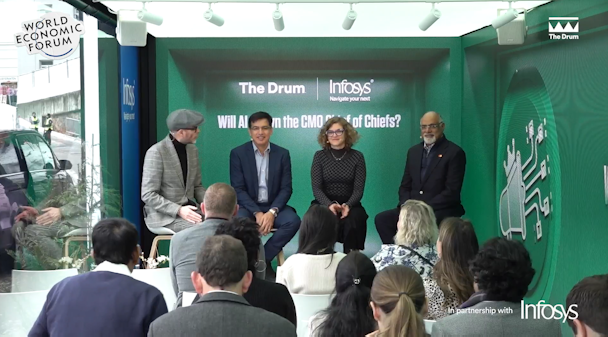Marketing not perceived as viable career choice, say CMOs in Davos discussion
Marketers from Mastercard, Boston Consulting and Infosys argue that, despite AI offering enormous opportunities to elevate the CMO function within the C-suite, the perception of marketing among young people is facing a crisis

Will AI make the CMO the chief of chiefs discussion?
Young people don’t see marketing as a viable career. This was the consensus when The Drum, in partnership with Infosys, hosted a discussion at the World Economic Forum in Davos. The panel, Will AI Crown the CMO Chief of Chiefs?, featured Mastercard’s CMO Raja Rajamannar, Boston Consulting CMO Jessica Apotheker and Infosys CMO Sumit Virmani, who all shared their thoughts on whether AI could ultimately see more CMOs becoming CEOs in the coming years.
Advertisement
A Google search shows that, currently, not a single FTSE 100 company CEO comes from a CMO position and while panelists suggested that AI (if used intelligently) will help to change that statistic in the future, concern around the perception of marketing as a career choice was voiced.
Rajamannar said: “The Association of National Advertisers in the US surveyed college students to rank all professions as potential careers. In the year I qualified, marketing was the number one profession as a career choice. Today, marketing as a career ranks below accounting and even nursing. That’s pretty sad. There is a belief that marketing is a con game, that it’s about playing mind tricks. Students’ perception is that marketers are like used car salesmen. It’s not seen as a noble profession.”
Advertisement
According to Virmani of Infosys, there remains a fundamental disconnect at a college level of exactly what marketing is and what marketers and marketing bring to a business. He believes that many feel it is more about good times and pretty pictures than delivering business results.
“Even from the brightest schools in the world, we get interns coming to us with the idea that marketing is all about glamour and glitz,” said Virmani. “They haven’t understood that marketing is actually all about driving growth, driving profit and driving their business forward. That conversation is alien to them. Unless we foundationally fill the supply chain [with people who understand marketing] we will be struggling to get people into marketing who understand the true power of marketing.
So, with so much change impacting the marketing sector, how should the industry be positioned and ‘sold’ to young people considering a marketing career?
Suggested newsletters for you
“Marketing has to be positioned as a fast-evolving, intellectually stimulating profession which requires a very broad skill set,” said Boston Consulting’s Apotheker. “It must show the sector offers many opportunities to make a real business impact. And you can have fun at the same time. If you are the type of person who wants to be continually learning new things in a fast-paced, dynamic environment then marketing is the career path to take.”
In all reality, there has perhaps never been a better time to become a marketer. The panel concluded that the opportunities offered by developments in AI mean the CMO can now market themselves within their organizations by showcasing the tangible value that they bring to the boardroom table and demonstrating how other companies are leveraging marketing for additional value.
Rajamannar said: “It’s extremely ironic, but marketers have been lousy at marketing marketing as a function for many years. We are just terrible at that. I think because, classically and traditionally, marketers have been very right-brained.”
So, how can we see more CMOs making it to the top table in the future?
The panel concluded that CMOs can, more regularly, become company CEOs by focusing on performance, taking responsibility for company growth and leveraging innovation and creativity in a competitive landscape.
As Apotheker said: “If the CMO doesn’t raise their voice right now and say ‘I’m the voice of the customer’ here and ask ‘how are we thinking about these new technologies?’ and ‘how we are applying them to serve value first and foremost?’ then that will be lost on many companies and the opportunity for the CMO to grow beyond marketing will not be seized.”

